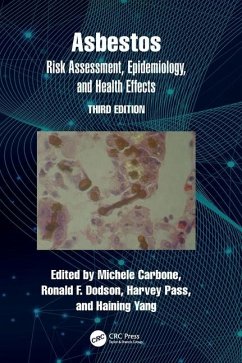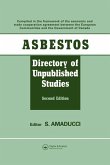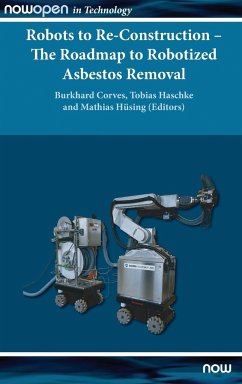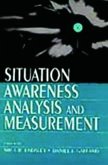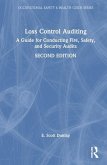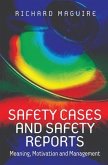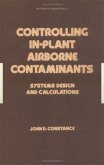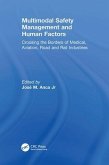Asbestos
Risk Assessment, Epidemiology, and Health Effects
Herausgeber: Carbone, Michele; Pass, Harvey; Dodson, Ronald
Asbestos
Risk Assessment, Epidemiology, and Health Effects
Herausgeber: Carbone, Michele; Pass, Harvey; Dodson, Ronald
- Gebundenes Buch
- Merkliste
- Auf die Merkliste
- Bewerten Bewerten
- Teilen
- Produkt teilen
- Produkterinnerung
- Produkterinnerung
Now in its third edition, this bestseller explores the pathological complexities of asbestos-related disease and examines how asbestos induces diseases in biological systems, with four new chapters on asbestosis and immunity, asbestos litigation, and surgical and non-surgical management of mesothelioma.
Andere Kunden interessierten sich auch für
![Asbestos Asbestos]() Asbestos23,99 €
Asbestos23,99 €![Robots to Re-Construction - The Roadmap to Robotized Asbestos Removal Robots to Re-Construction - The Roadmap to Robotized Asbestos Removal]() Robots to Re-Construction - The Roadmap to Robotized Asbestos Removal186,99 €
Robots to Re-Construction - The Roadmap to Robotized Asbestos Removal186,99 €![Situation Awareness Analysis and Measurement Situation Awareness Analysis and Measurement]() Situation Awareness Analysis and Measurement120,99 €
Situation Awareness Analysis and Measurement120,99 €![Loss Control Auditing Loss Control Auditing]() E. Scott DunlapLoss Control Auditing201,99 €
E. Scott DunlapLoss Control Auditing201,99 €![Safety Cases and Safety Reports Safety Cases and Safety Reports]() Richard MaguireSafety Cases and Safety Reports90,99 €
Richard MaguireSafety Cases and Safety Reports90,99 €![Controlling In-Plant Airborne Contaminants Controlling In-Plant Airborne Contaminants]() ConstanceControlling In-Plant Airborne Contaminants385,99 €
ConstanceControlling In-Plant Airborne Contaminants385,99 €![Multimodal Safety Management and Human Factors Multimodal Safety Management and Human Factors]() José M. Anca JrMultimodal Safety Management and Human Factors91,99 €
José M. Anca JrMultimodal Safety Management and Human Factors91,99 €-
-
-
Now in its third edition, this bestseller explores the pathological complexities of asbestos-related disease and examines how asbestos induces diseases in biological systems, with four new chapters on asbestosis and immunity, asbestos litigation, and surgical and non-surgical management of mesothelioma.
Hinweis: Dieser Artikel kann nur an eine deutsche Lieferadresse ausgeliefert werden.
Hinweis: Dieser Artikel kann nur an eine deutsche Lieferadresse ausgeliefert werden.
Produktdetails
- Produktdetails
- Verlag: CRC Press
- 3. Auflage
- Seitenzahl: 428
- Erscheinungstermin: 21. August 2024
- Englisch
- Abmessung: 260mm x 183mm x 27mm
- Gewicht: 995g
- ISBN-13: 9781032521060
- ISBN-10: 1032521066
- Artikelnr.: 70147141
- Herstellerkennzeichnung
- Books on Demand GmbH
- In de Tarpen 42
- 22848 Norderstedt
- info@bod.de
- 040 53433511
- Verlag: CRC Press
- 3. Auflage
- Seitenzahl: 428
- Erscheinungstermin: 21. August 2024
- Englisch
- Abmessung: 260mm x 183mm x 27mm
- Gewicht: 995g
- ISBN-13: 9781032521060
- ISBN-10: 1032521066
- Artikelnr.: 70147141
- Herstellerkennzeichnung
- Books on Demand GmbH
- In de Tarpen 42
- 22848 Norderstedt
- info@bod.de
- 040 53433511
Michele Carbone is Director of Thoracic Oncology at the University of Hawaii Cancer Center, USA. With degrees from the Medical School of Rome, University of Rome and University of Chicago, Dr. Carbone specializes in pleural pathology and mesothelioma. Dr. Carbone discovered that heterozygous germline BAP1 mutations modulate susceptibility to asbestos and cause mesothelioma. Carbone's research is a combination of fieldwork in the third world and in remote areas of the USA, sophisticated molecular genetics work in his laboratory, and vital clinical diagnostic work. Ronald F. Dodson's research interests include the use of light and transmission electron microscopy in identification and/or effects of particulates in tissue and other biological environments. He retired from academia in 2005 and established his own company, Dodson Environmental Consulting in Tyler, Texas, USA. He continues to conduct research in this role as well as write scientific and biomedical publications and serve as an expert in his field as requested by the private sector, academia, federal agencies, and international agencies/scientific organizations. Dr. Dodson's research/ academic career included serving as a reviewer for scientific journals and serving as an Advisory Board Member on the Texas Department of Health's committee that was charged with developing the State Law governing asbestos-related activities in public buildings in Texas. Harvey Pass is Professor in Thoracic Oncology in the Department of Cardiothoracic Surgery at NYU Langone Health's Perlmutter Cancer Center. He serves as Chief of the Division of Thoracic Oncology at NYU and oversees a laboratory at Bellevue Hospital where much important research work funded by the National Cancer Institute takes place, including the new Mesothelioma Pathogenesis Program Project. Dr. Pass has held numerous positions in professional associations, has served as a guest reviewer for major medical journals and publications and has served as a consultant to private companies as well as public agencies and foundations. Haining Yang is Professor in the University of Hawaii Cancer Center at the University of Hawaii at M¿noa, USA. Her research work focuses on the pathogenesis of mesothelioma, a malignancy often related to exposure to asbestos or other carcinogenic mineral fibers. She discovered that a protein called high mobility group box 1 protein (HMGB1) kickstarts the growth of mesothelioma cancer cells once the individual is exposed to asbestos. As a result, Dr. Yang explored targeting these proteins as a therapy method for mesothelioma. She was one of the recipients of the American Association for Cancer Research (AACR)-Landon Foundation INNOVATOR Award for International Collaboration in Cancer Research in 2008. She also received the iMig Research Award in 2018.
1. The History of Asbestos Utilization and Recognition of Asbestos-induced
Diseases. 2. Asbestos Analysis Methods. 3. Analysis and Relevance of
Asbestos/Elongated Particulate Burden in Tissue. 4. Evaluation of Asbestos
Exposure. 5. Mechanisms of Asbestos Carcinogenesis. 6. Epidemiology of
Mesothelioma in the World. 7. Environmental Exposure to Asbestos and
Cancer. 8. Asbestos and Immunity. 9. Medical Findings Related to Asbestos
Exposure. 10. Mesothelioma in 2024: What's New?. 11. Pathologic Diagnosis
of Mesothelioma. 12. Bioinformatics Approaches to Studying Diffuse
Malignant Mesothelioma. 13. OncoTherapy in Mesothelioma. 14. Surgical
Management of Mesothelioma. 15. Asbestos Related Cancers. 16. Asbestos
Litigation and Trust Funds in the United States.
Diseases. 2. Asbestos Analysis Methods. 3. Analysis and Relevance of
Asbestos/Elongated Particulate Burden in Tissue. 4. Evaluation of Asbestos
Exposure. 5. Mechanisms of Asbestos Carcinogenesis. 6. Epidemiology of
Mesothelioma in the World. 7. Environmental Exposure to Asbestos and
Cancer. 8. Asbestos and Immunity. 9. Medical Findings Related to Asbestos
Exposure. 10. Mesothelioma in 2024: What's New?. 11. Pathologic Diagnosis
of Mesothelioma. 12. Bioinformatics Approaches to Studying Diffuse
Malignant Mesothelioma. 13. OncoTherapy in Mesothelioma. 14. Surgical
Management of Mesothelioma. 15. Asbestos Related Cancers. 16. Asbestos
Litigation and Trust Funds in the United States.
1. The History of Asbestos Utilization and Recognition of Asbestos-induced
Diseases. 2. Asbestos Analysis Methods. 3. Analysis and Relevance of
Asbestos/Elongated Particulate Burden in Tissue. 4. Evaluation of Asbestos
Exposure. 5. Mechanisms of Asbestos Carcinogenesis. 6. Epidemiology of
Mesothelioma in the World. 7. Environmental Exposure to Asbestos and
Cancer. 8. Asbestos and Immunity. 9. Medical Findings Related to Asbestos
Exposure. 10. Mesothelioma in 2024: What's New?. 11. Pathologic Diagnosis
of Mesothelioma. 12. Bioinformatics Approaches to Studying Diffuse
Malignant Mesothelioma. 13. OncoTherapy in Mesothelioma. 14. Surgical
Management of Mesothelioma. 15. Asbestos Related Cancers. 16. Asbestos
Litigation and Trust Funds in the United States.
Diseases. 2. Asbestos Analysis Methods. 3. Analysis and Relevance of
Asbestos/Elongated Particulate Burden in Tissue. 4. Evaluation of Asbestos
Exposure. 5. Mechanisms of Asbestos Carcinogenesis. 6. Epidemiology of
Mesothelioma in the World. 7. Environmental Exposure to Asbestos and
Cancer. 8. Asbestos and Immunity. 9. Medical Findings Related to Asbestos
Exposure. 10. Mesothelioma in 2024: What's New?. 11. Pathologic Diagnosis
of Mesothelioma. 12. Bioinformatics Approaches to Studying Diffuse
Malignant Mesothelioma. 13. OncoTherapy in Mesothelioma. 14. Surgical
Management of Mesothelioma. 15. Asbestos Related Cancers. 16. Asbestos
Litigation and Trust Funds in the United States.

